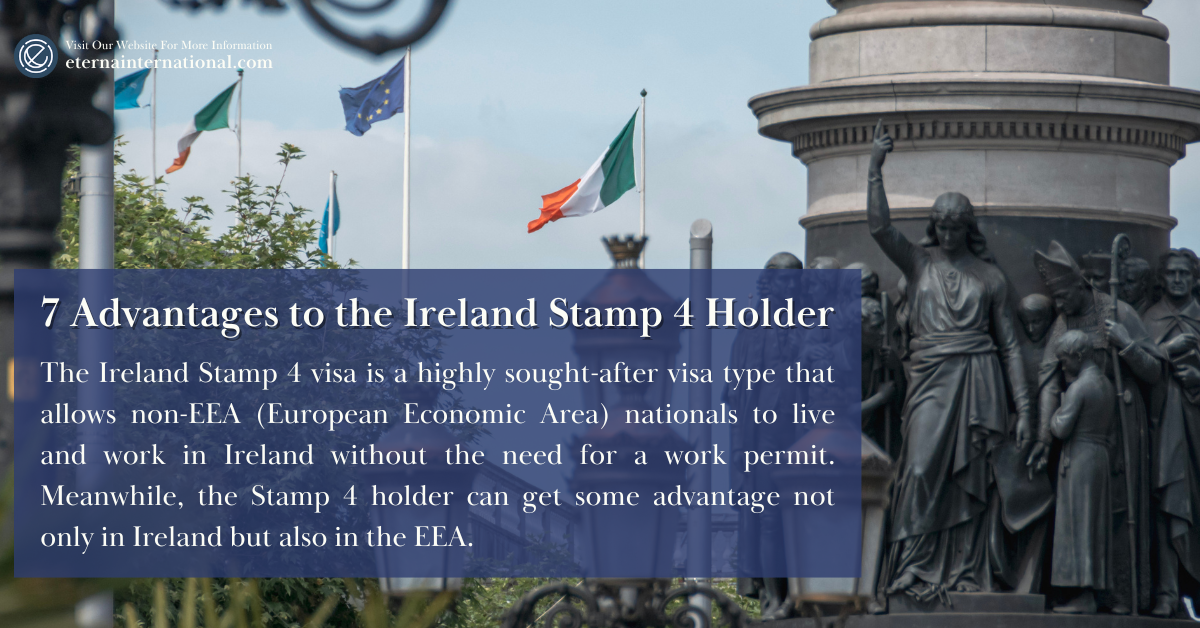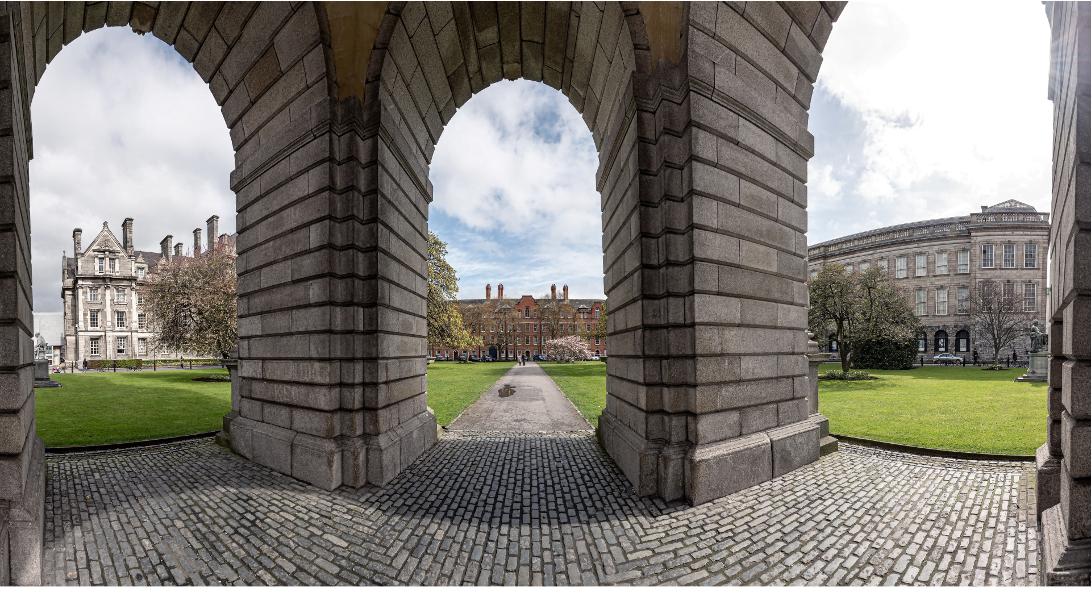The Ireland Stamp 4 visa is a highly sought-after visa type that allows non-EEA (European Economic Area) nationals to live and work in Ireland without the need for a work permit. Meanwhile, the Stamp 4 holder can get some advantage not only in Ireland but also in the European Economic Area (EEA).

1. No Need for a Work Permit
The most significant advantage of the Stamp 4 visa is that it allows the holder to work freely in Ireland without the need for an employment permit. This benefit opens up a wide range of employment opportunities, as individuals are not restricted to jobs that meet the criteria for employment permits. It also offers a more straightforward process for employers, as they do not need to apply for a work permit on the individual’s behalf.
2. Unlimited Renewals
The Stamp 4 visa can be renewed indefinitely, as long as the individual continues to meet the 1-day residency requires Pre-Year to remain on the visa. This provides a significant advantage for those wishing to make Ireland their permanent home, as it offers a level of stability and security not always available with other visa types.
3. Family Reunification
Another advantage of the Stamp 4 visa is that it allows for family reunification. This means that individuals can apply for their spouse, partner, or dependent children to join them in Ireland. This is a significant benefit for individuals looking to make Ireland their long-term home, as it allows them to bring their loved ones with them.
4. Pathway to Citizenship
Holders of the Stamp 4 visa can count their time spent in Ireland towards the naturalization requirement for Irish citizenship. This makes the Stamp 4 visa a potential pathway toward becoming an Irish citizen, which comes with additional rights and benefits, such as the right to vote in all elections and referendums.
5. Access to Social Services
Stamp 4 visa holders are eligible for the same social services as Irish citizens, including health care, education, and social welfare benefits. This is a significant advantage, as it provides a safety net and support for individuals and families living in Ireland.
6. Travel within the EEA/Schengen
Having a Stamp 4 visa can make travel within the EEA/Schengen easier than it would be for many other non-EEA nationals. Though you need to apply for a visa before your trip, most of the embassies provide an online application system, to help you apply for the visa easier, eg. the Danmark embassy.
Therefore, for short-term visits, tourists, or business trips, you usually won’t need a separate visa to visit other EEA/Schengen countries.
- Tourism: You can travel to other EEA/Schengen countries for tourism purposes. This typically covers stays of up to 90 days within 180 days.
- Business Trips: If you’re traveling for business purposes, such as attending meetings, conferences, or training, you’re generally allowed to do so without a work permit for short periods.
Always check with the embassy or consulate of the EEA country you plan to visit to ensure you have the correct documentation and meet their entry requirements. Laws and regulations can change, and each country may have different rules or exceptions.
7. Study within the EEA
Before you complete the residency requirement applies for an Ireland passport. Some EU countries may categorize applicants as EU students if:
- They have resided within the European Union for a certain period before applying for the study program of their choice.
- They hold a permanent residence permit (like Stamp 4) in any state of the European Union.
- They hold the status of refugee in any state of the European Union.
As a Stamp 4 holder, if you have doubts about your eligibility as an EU student, it’s advisable to consult your higher education institution. Generally, EU students benefit from reduced tuition fees compared to non-EU students and have a broader selection of scholarships and grants to aid their studies. Keep in mind that application deadlines for higher education can differ based on the applicant’s status as an EU or non-EU student.
EU students generally pay lower tuition fees compared to international students across European countries, with many offerings free or highly subsidized tuition for EU students. International students can expect to pay anywhere from around €4,000 to over €20,000 per year depending on the country and program.
Here is a comparison and summary of the average tuition fees for EU students and international students in some European countries:
Ireland:
– EU students: Free for bachelor’s
– Non-EU students: From €9,750 (~US$11,400) per year
Austria:
– EU students: Free
– International students: €726.72 (~US$850) per semester
Belgium:
– EU students: Around €906 (~US$1,060) per year
– Non-EU students: €4,175+ (~US$4,900+) per year
Denmark:
– EU students: Free
– Non-EU students: €6,000-16,000 (~US$7,020-18,730) per year
Finland:
– EU/EEA students: Free
– Non-EU/EEA students: €4,000-18,000 (~US$4,700-21,070) per year
France:
– EU/EEA students: €170-380 per year
– Non-EU/EEA students: €2,770-3,770 (~US$3,100-4,240) per year
Germany:
– EU students: Free for bachelor’s and PhD
– Non-EU students: €3,000 (~US$3,500) per year for bachelor’s, €20,000 (US$23,400) per year for master’s
Italy:
– EU students: €950-4,000 (~US$920-1,100) per year
– Non-EU students: Slightly higher than EU students

The Ireland Stamp 4 visa offers a host of advantages making it a highly attractive option for individuals looking to live and work in Ireland long-term. For this reason, more and more immigrants try to obtain their Stamp 4 Visa and future Ireland citizenship through the Ireland investor immigrant program (IIP). Despite the closure of the program, applications already submitted are still being processed, and the application amount for the IIP in 2023, is even more than the total amount for the entire of 2022.



